Explore Walt Whitman’s “The Wound-Dresser,” set in the battlefield infirmaries and operating theaters of 1860s Washington, D.C. Actor David Strathairn, playwright Tony Kushner, composer Matthew Aucoin, opera star Davóne Tines, physician-writers Rafael Campo and Abraham Verghese, and historian Drew Faust join Elisa New to discuss how the trauma of the Civil War shaped American history.
Special thanks to our humanities advisers: Rafael Campo, MA, MD, DLitt(Hon) Associate Professor of Medicine Harvard Medical School; Dr. Steven Conn, W. E. Smith Professor of History, Miami University; and Ramie Targoff.
Interested in learning more? Poetry in America offers a wide range of courses, all dedicated to bringing poetry into classrooms and living rooms around the world.
by Walt Whitman
The Wound-Dresser by Walt Whitman
1
An old man bending I come among new faces,
Years looking backward resuming in answer to children,
Come tell us old man, as from young men and maidens that love me,
(Arous’d and angry, I’d thought to beat the alarum, and urge relentless war,
But soon my fingers fail’d me, my face droop’d and I resign’d myself,
To sit by the wounded and soothe them, or silently watch the dead;)
Years hence of these scenes, of these furious passions, these chances,
Of unsurpass’d heroes, (was one side so brave? the other was equally brave;)
Now be witness again, paint the mightiest armies of earth,
Of those armies so rapid so wondrous what saw you to tell us?
What stays with you latest and deepest? of curious panics,
Of hard-fought engagements or sieges tremendous what deepest remains?
2
O maidens and young men I love and that love me,
What you ask of my days those the strangest and sudden your talking recalls,
Soldier alert I arrive after a long march cover’d with sweat and dust,
In the nick of time I come, plunge in the fight, loudly shout in the rush of successful charge,
Enter the captur’d works—yet lo, like a swift running river they fade,
Pass and are gone they fade—I dwell not on soldiers’ perils or soldiers’ joys,
(Both I remember well—many of the hardships, few the joys, yet I was content.)
But in silence, in dreams’ projections,
While the world of gain and appearance and mirth goes on,
So soon what is over forgotten, and waves wash the imprints off the sand,
With hinged knees returning I enter the doors, (while for you up there,
Whoever you are, follow without noise and be of strong heart.)
Bearing the bandages, water and sponge,
Straight and swift to my wounded I go,
Where they lie on the ground after the battle brought in,
Where their priceless blood reddens the grass the ground,
Or to the rows of the hospital tent, or under the roof’d hospital,
To the long rows of cots up and down each side I return,
To each and all one after another I draw near, not one do I miss,
An attendant follows holding a tray, he carries a refuse pail,
Soon to be fill’d with clotted rags and blood, emptied, and fill’d again.
I onward go, I stop,
With hinged knees and steady hand to dress wounds,
I am firm with each, the pangs are sharp yet unavoidable,
One turns to me his appealing eyes—poor boy! I never knew you,
Yet I think I could not refuse this moment to die for you, if that would save you.
3
On, on I go, (open doors of time! open hospital doors!)
The crush’d head I dress, (poor crazed hand tear not the bandage away,)
The neck of the cavalry-man with the bullet through and through I examine,
Hard the breathing rattles, quite glazed already the eye, yet life struggles hard,
(Come sweet death! be persuaded O beautiful death!
In mercy come quickly.)
From the stump of the arm, the amputated hand,
I undo the clotted lint, remove the slough, wash off the matter and blood,
Back on his pillow the soldier bends with curv’d neck and side falling head,
His eyes are closed, his face is pale, he dares not look on the bloody stump,
And has not yet look’d on it.
I dress a wound in the side, deep, deep,
But a day or two more, for see the frame all wasted and sinking,
And the yellow-blue countenance see.
I dress the perforated shoulder, the foot with the bullet-wound,
Cleanse the one with a gnawing and putrid gangrene, so sickening, so offensive,
While the attendant stands behind aside me holding the tray and pail.
I am faithful, I do not give out,
The fractur’d thigh, the knee, the wound in the abdomen,
These and more I dress with impassive hand, (yet deep in my breast a fire, a burning flame.)
4
Thus in silence in dreams’ projections,
Returning, resuming, I thread my way through the hospitals,
The hurt and wounded I pacify with soothing hand,
I sit by the restless all the dark night, some are so young,
Some suffer so much, I recall the experience sweet and sad,
(Many a soldier’s loving arms about this neck have cross’d and rested,
Many a soldier’s kiss dwells on these bearded lips.)
The Wound-Dresser by Walt Whitman
1
An old man bending I come among new faces,
Years looking backward resuming in answer to children,
Come tell us old man, as from young men and maidens that love me,
(Arous’d and angry, I’d thought to beat the alarum, and urge relentless war,
But soon my fingers fail’d me, my face droop’d and I resign’d myself,
To sit by the wounded and soothe them, or silently watch the dead;)
Years hence of these scenes, of these furious passions, these chances,
Of unsurpass’d heroes, (was one side so brave? the other was equally brave;)
Now be witness again, paint the mightiest armies of earth,
Of those armies so rapid so wondrous what saw you to tell us?
What stays with you latest and deepest? of curious panics,
Of hard-fought engagements or sieges tremendous what deepest remains?
2
O maidens and young men I love and that love me,
What you ask of my days those the strangest and sudden your talking recalls,
Soldier alert I arrive after a long march cover’d with sweat and dust,
In the nick of time I come, plunge in the fight, loudly shout in the rush of successful charge,
Enter the captur’d works—yet lo, like a swift running river they fade,
Pass and are gone they fade—I dwell not on soldiers’ perils or soldiers’ joys,
(Both I remember well—many of the hardships, few the joys, yet I was content.)
But in silence, in dreams’ projections,
While the world of gain and appearance and mirth goes on,
So soon what is over forgotten, and waves wash the imprints off the sand,
With hinged knees returning I enter the doors, (while for you up there,
Whoever you are, follow without noise and be of strong heart.)
Bearing the bandages, water and sponge,
Straight and swift to my wounded I go,
Where they lie on the ground after the battle brought in,
Where their priceless blood reddens the grass the ground,
Or to the rows of the hospital tent, or under the roof’d hospital,
To the long rows of cots up and down each side I return,
To each and all one after another I draw near, not one do I miss,
An attendant follows holding a tray, he carries a refuse pail,
Soon to be fill’d with clotted rags and blood, emptied, and fill’d again.
I onward go, I stop,
With hinged knees and steady hand to dress wounds,
I am firm with each, the pangs are sharp yet unavoidable,
One turns to me his appealing eyes—poor boy! I never knew you,
Yet I think I could not refuse this moment to die for you, if that would save you.
3
On, on I go, (open doors of time! open hospital doors!)
The crush’d head I dress, (poor crazed hand tear not the bandage away,)
The neck of the cavalry-man with the bullet through and through I examine,
Hard the breathing rattles, quite glazed already the eye, yet life struggles hard,
(Come sweet death! be persuaded O beautiful death!
In mercy come quickly.)
From the stump of the arm, the amputated hand,
I undo the clotted lint, remove the slough, wash off the matter and blood,
Back on his pillow the soldier bends with curv’d neck and side falling head,
His eyes are closed, his face is pale, he dares not look on the bloody stump,
And has not yet look’d on it.
I dress a wound in the side, deep, deep,
But a day or two more, for see the frame all wasted and sinking,
And the yellow-blue countenance see.
I dress the perforated shoulder, the foot with the bullet-wound,
Cleanse the one with a gnawing and putrid gangrene, so sickening, so offensive,
While the attendant stands behind aside me holding the tray and pail.
I am faithful, I do not give out,
The fractur’d thigh, the knee, the wound in the abdomen,
These and more I dress with impassive hand, (yet deep in my breast a fire, a burning flame.)
4
Thus in silence in dreams’ projections,
Returning, resuming, I thread my way through the hospitals,
The hurt and wounded I pacify with soothing hand,
I sit by the restless all the dark night, some are so young,
Some suffer so much, I recall the experience sweet and sad,
(Many a soldier’s loving arms about this neck have cross’d and rested,
Many a soldier’s kiss dwells on these bearded lips.)
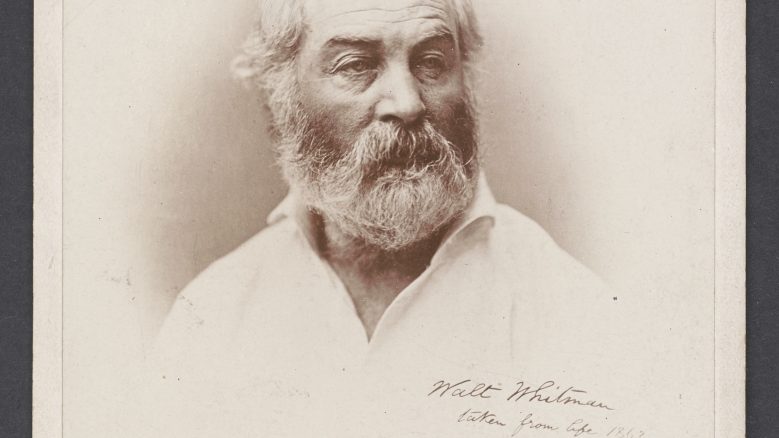
"The real war will never get into the history books," wrote celebrated American poet Walt Whitman in his 1882 autobiographical text Specimen Days and Collect. Shaken by his first-hand experiences with trauma and suffering during the Civil War, Whitman searches for solace in the poetics of pain. Image courtesy of Alderman Library, University of Virginia.
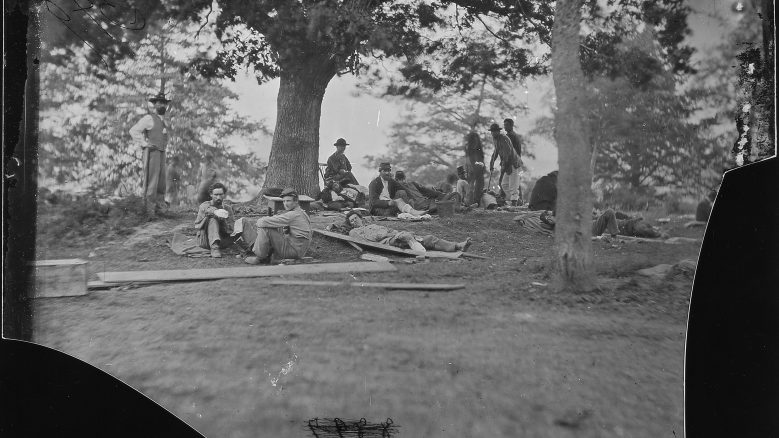
Civial War historian Drew Faust reflects on Walt Whitman's first encounter with war: "He would have read about war in the newspapers, but he would not yet have seen it face to face. I believe the first time he really confronted the horror of war himself was when he went to look for his brother at Fredericksburg late in 1862. He comes across this pile of amputated limbs that remains this vivid image in his mind." Image courtesy of the U.S. National Archives.
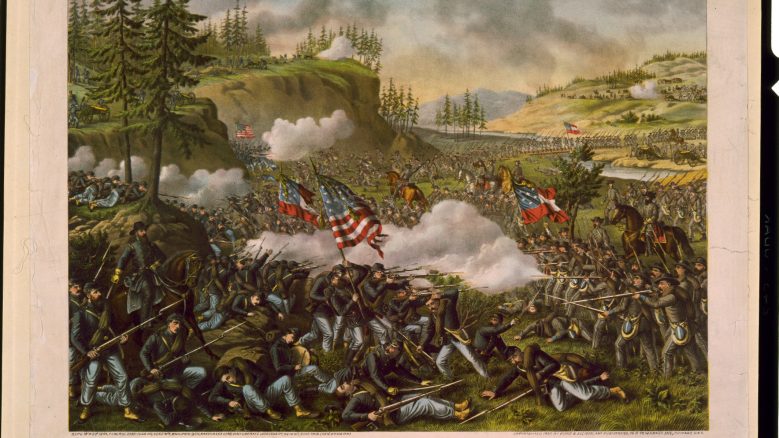
Poet and physician Rafael Campo reads in Whitman's poetry a synthesis of the personal and political—a link between the individual and the body politic. "To see all of those broken bodies, what he witnessed then was, I think, our broken nation." Image courtesy of the Library of Congress.
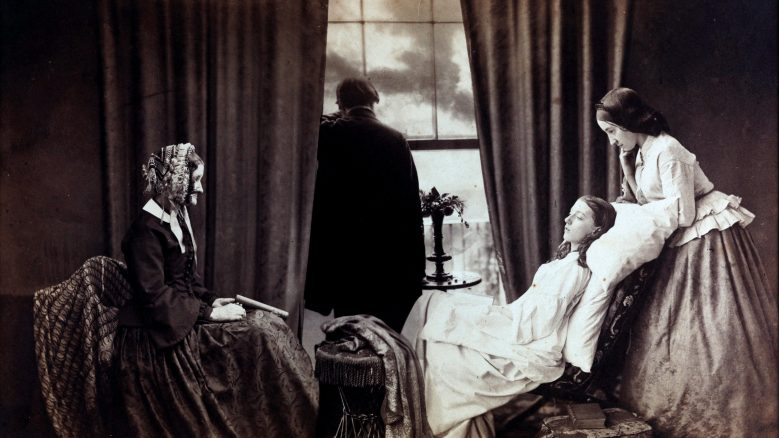
"This is a way that Whitman has a lot in common with opera. In opera, deathbed scenes are the most extravagant. They're the big showpieces, they often last longer than feels plausible. Whitman has some really touching, really painful, but also really lavish scenes that feel almost too intimate." — Matthew Aucoin (Image Credit: George Eastman Museum)
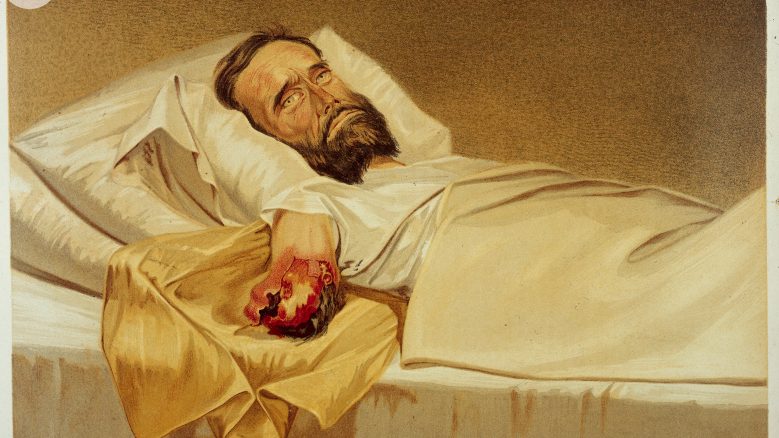
"In this poem, because in some ways it is so graphic, he wants us to be present and to remove the dressings, in a sense. It's a kind of a paradox of the poem, that he's dressing the wounds, but he's also making them more visible to us." — Poet and physician Rafael Campo (Image Credit: Wellcome Collection).
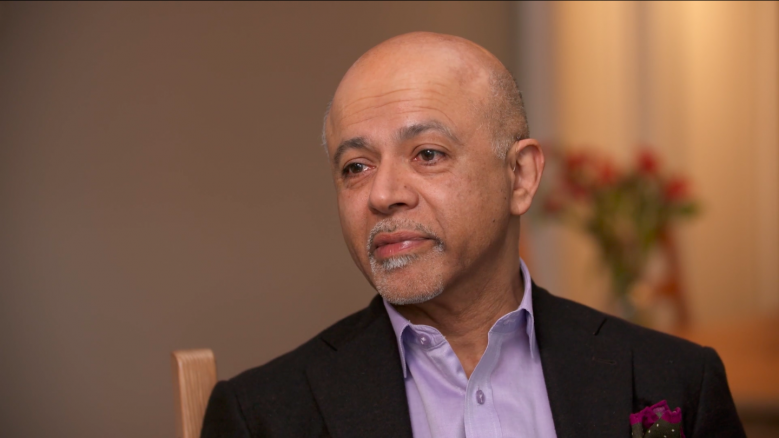
"Many of us come to medicine because we are wounded ourselves, and in ministering to others, we're sort of healing our wounds, so to speak. You can almost see Whitman in his desire to help them, he's taking care of something in himself." — Author and physician Abraham Verghese
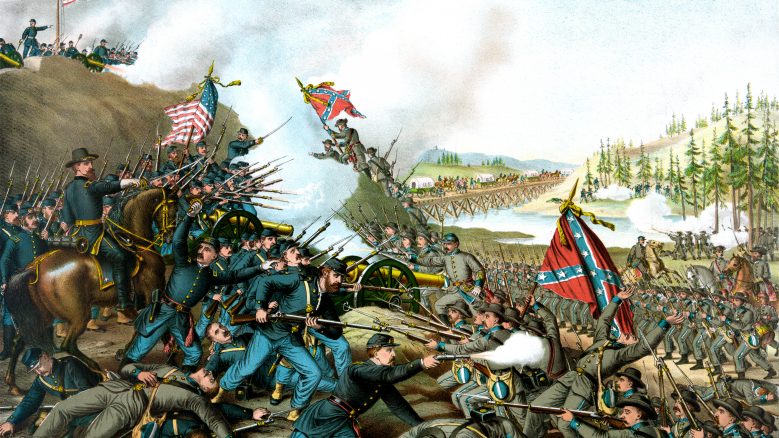
"These people who sacrificed so much for these beautiful ideals, for democracy, for the Union, for an end to slavery, you know, gave up life and limb for this." — Playwright Tony Kushner (Image Credit: Library of Congress).
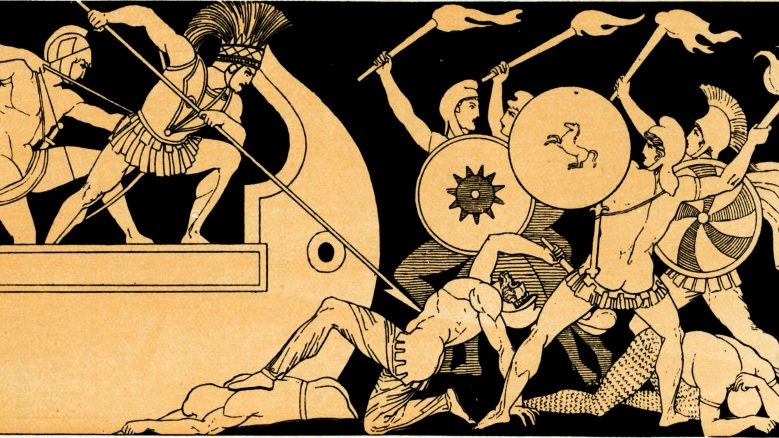
War occupies a central place within Western literary history, stretching all the way back to Homer's Iliad—a poem, like Whitman's, epic in scale and concerned with the devastating effects of war on the individual. Image courtesy of Internet Archive.
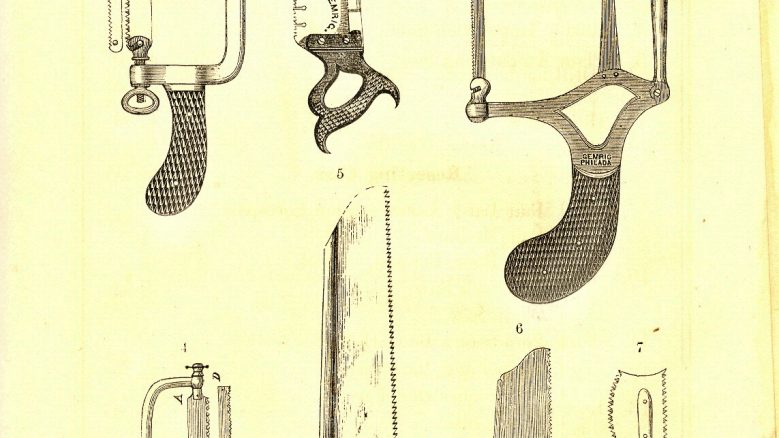
New technologies of war, like the minie ball and breech-loading firearms, far outpaced innovations in medicine: medical professionals couldn't keep pace with the destruction done by these brutally efficient weapons. Author and physician Abraham Verghese observes, "The main role of medicine in that era was to chop off the limb." Image courtesy of Internet Archive.